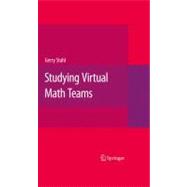
What is included with this book?
| Introducing Group Cognition in Virtual Math Teams | |
| Introduction to Part I | p. 3 |
| A Chat About Chat | p. 7 |
| The VMT Vision | p. 17 |
| Mathematical Discourse as Group Cognition | p. 31 |
| Interactional Methods and Social Practices in VMT | p. 41 |
| From Individual Representations to Group Cognition | p. 57 |
| Studying Group Cognition in Virtual Math Teams | |
| Introduction to Part II | p. 77 |
| The Sequential co-Construction of the Joint Problem Space | p. 83 |
| The Organization of Graphical, Narrative and Symbolic Interations | p. 99 |
| Question Co-Construction in VMT Chats | p. 141 |
| Resolving Differences of Perspective in a VMT Session | p. 161 |
| Studying Group Discourse in Virtual Math Teams | |
| Introduction to Part III | p. 181 |
| Representational Practices in VMT | p. 185 |
| Student and Team Agency in VMT | p. 207 |
| Group Creativity in VMT | p. 225 |
| Inscriptions, Mathematical Ideas and Reasoning in VMT | p. 237 |
| Reading's Work in VMT | p. 261 |
| Designing the VMT Collaboration Environment | |
| Introduction to Part IV | p. 279 |
| The Integration of Dual-Interaction Spaces | p. 281 |
| Designing a Mix of Synchronous and Asynchronous Media for VMT | p. 295 |
| Deictic Referencing in VMT | p. 311 |
| Scripting Group Processes in VMT | p. 327 |
| Helping Agents in VMT | p. 335 |
| Representing Group Interaction in VMT | |
| Introduction to Part V | p. 357 |
| Thread-Based Analysis of Patterns in VMT | p. 359 |
| Studying Response-Structure Confusion in VMT | p. 373 |
| A Multidimensional Coding Scheme for VMT | p. 399 |
| Combining Coding and Conversion Analysis of VMT Chats | p. 421 |
| Polyphonic Inter-Animation of Voices in VMT | p. 451 |
| A Model for Analyzing Math Knowledge Building in VMT | p. 475 |
| Conceptualizing Group Cognition in VMT | |
| Introduction to Part VI | p. 501 |
| Meaning Making in VMT | p. 505 |
| Critical Ethnography in the VMT Project | p. 529 |
| Toward a Science of Group Cognition | p. 555 |
| Notes | p. 581 |
| References | p. 585 |
| Name Index | p. 609 |
| Subject Index | p. 615 |
| Table of Contents provided by Ingram. All Rights Reserved. |
The New copy of this book will include any supplemental materials advertised. Please check the title of the book to determine if it should include any access cards, study guides, lab manuals, CDs, etc.
The Used, Rental and eBook copies of this book are not guaranteed to include any supplemental materials. Typically, only the book itself is included. This is true even if the title states it includes any access cards, study guides, lab manuals, CDs, etc.